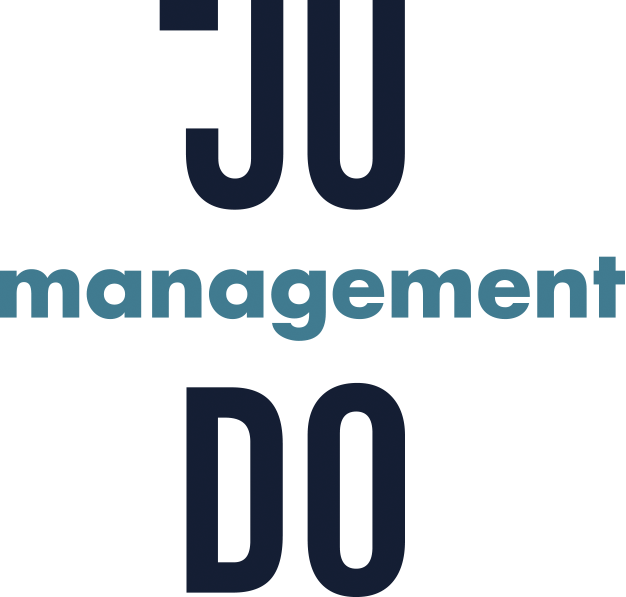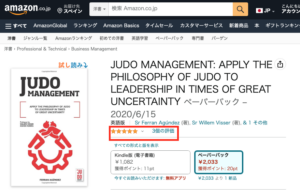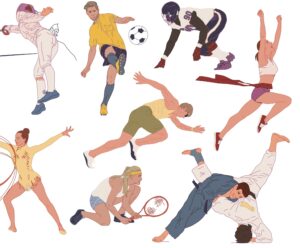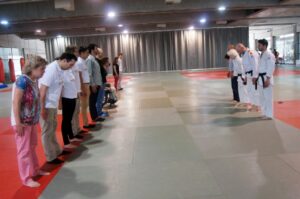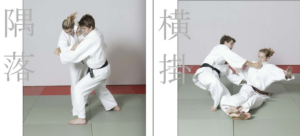Jita kyoei the Judo principle of prosperity and mutual benefit and The way up, a psychological state in which a person lifts not only himself, but also her or his environment to a higher level.
The way up is a psychological state in which a person lifts not only himself, but also her or his environment to a higher level.
To achieve this psychological state, the person in question must:
– Empathize with the outside world;
– Be result-oriented;
– Being guided by inner strength;
– Welcome feedback and also seek it out.
Taking oneself and the environment (company or sports organization) to a higher level is very satisfying.
Unlike the way up, many people seek out situations where they feel comfortable and are influenced by what others think of them. They are often driven by self-interest and try to avoid criticism. As a result, people and sports organizations are working far below their potential.
Meeting the four conditions to reach the way up can be done by asking the following questions:
➢ With regard to “empathy with the outside world”: How do others feel about this situation?
➢ With regard to “being result-oriented”: What result do I want to create?
➢ Regarding “inner strength”: What would my story be if I lived by the standards and values I expect from others?
➢ Regarding “welcoming and seeking feedback”: What strategies could I follow to achieve my goal in this situation?
Way up brings an organization closer to a High Performance Organization (HPO).
A HPO has the following characteristics:
1. The management is of high quality. It combines integrity and coaching leadership with rapid decision-making.
2. The culture is open and action-oriented. The emphasis is on creating engagement and dialogue.
3. Focused on the long term.
4. The team is diverse, of high quality and willing to take responsibility for improving the result.
5. The sports organization is constantly improving and renewing itself.
And if, with all the professionals in a sports organization, the entire team, always want to do better, better than the opponents, that you want to win, that releases a lot of energy.
Energy through which one can move; can move faster than the others on the way to a good result. This is energy that comes mainly from inner strength.
A sports organization or individual(s) can also remain energetic by a number of logical principles, namely by seeing, willing, being able to and feeling.
People have to face reality literally and figuratively. They are awakened by self-evident observation patterns, they have to learn to see with different eyes. If not, there will be no movement.
Willing refers to have an appealing vision; a vision that has appeal. Attraction also encourages movement, the use of energy.
Faith in one’s own abilities is also a source of energy, if one has no faith in one’s own abilities, one does not take a step, as it were.
If people feel a positive climate, if people (in a sport organization) are connected to each other and trust each other, that also generates energy.
Being positive releases energy and being negative blocks it.
So always stay positive and always see the positive qualities in the people around you.
Make sure there is a good feeling about one’s own life and work and always look for objective and constructive ideas.
Willem Visser
Executive coach, Strategic Adviser, International Lecturer, 8th Dan Judo IJF
With gratitude to all my teachers, specialists, colleagues and especially all the judoka that I was allowed to guide and to coach.
Sources and inspiring professionals:
Van der Horst, Cobben, Abe, Saitoh, Yamashita, Uemura, Sugawara, Murata, Hosokawa, Komata, Takahashi, Nakamura, Kasuga, Kawashima, Kariya, Brousse, Besson, Rougé, Ruska, Geesink, de Cree, Barta, Vachun, Viser, Lascau, McConnell, Snijders, Sins, Hoogendijk, Boersma, Odinot, van Dijk, Klok, Agúndez, Landsberg, Covey, de Waal, DeCaluwe, Drucker, Franzen, Goldratt, Hammer, Kets de Vries, Kotler, Mastenbroek, Mintzberg, Peters, Porter, Quinn, ten Bos, Trompenaars, Vinke, Weggeman, Wissema and many others.
